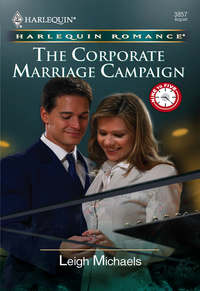
Полная версия
The Takeover Bid
Wyatt lounged into the seat across from her, planted his elbows on the wooden arms of the chair, tented his fingers under his chin, and waited.
She moved a chunk of stone out of the way. “I gather, from what you said out there, that you think you’ve bought Jackson out.”
I think I’ve bought him out? You wish I was only thinking, lady. But he had nothing to lose but a little time. Let her talk. Let her fool herself, if she wanted.
Let her think she’s in charge.
Of course, it was none of her business how the change of ownership had happened. “In a manner of speaking,” he said.
She nodded. “Do you know him well?”
What was with the sudden chattiness? He might as well warn her that a feeble effort at charm wasn’t going to get her anywhere. Not after the fireworks she’d already displayed. But why make it easy on her? It might be amusing to watch her attempt to beguile. “A few months, I suppose.”
“I see. How much did you pay him?”
Wyatt lifted his eyebrows. “I don’t see why that would be any of your business, Ms. Stafford.”
“Oh, I assure you it isn’t just idle curiosity—though I must admit to feeling some. The last time he mentioned a figure to me, he wanted half a million dollars.”
“That’s very interesting. You sound as if you think your…um…car business isn’t worth that much.”
She smiled.
Wyatt could smell danger. She looked as if she was having a good time. This was not going quite as he’d planned.
“No, I don’t,” she said. “In fact, I think that price is pretty steep—for his half.”
Half? The bonehead had never bothered to mention that he only owned half of the business. And that surprises you, Reynolds?
Or was it Mel Stafford who was pulling a con, trying to convince Wyatt to give up and go away?
He must have looked suspicious, but she drew herself up squarely. “I have all the paperwork to prove that Jackson’s a half owner.”
Now he was really leery. “Right. It’s here somewhere. And I’m sure you’ll be happy to dig it out and show it to me someday—when you have enough time. Probably around the turn of the next century. Come on, Ms. Stafford, stop trying to run a bluff on me.”
“I assure you, it’s no bluff. Jackson’s father was a small-town mechanic. How he ended up owning half a junkyard, I’m not quite sure—”
Wyatt didn’t think his expression had changed an iota, but she paused and looked at him thoughtfully.
“Oh, yes,” she admitted, “your assessment was quite right. It does resemble a junkyard, because it used to be one. It’s only in the last couple of years that it’s taken on a new role.”
“And become some kind of gold mine.”
She frowned. “More like opals, I’d say. We shovel tons and tons of debris to find one small jewel.”
The woman sounded absolutely serious. But she couldn’t be for real. Could she?
“At any rate,” she went on, “Jackson’s father ran the junkyard for years, stripping and selling parts now and then, but mostly just piling up more and more odd bits of vehicles. Where he got them all, I have no idea. When he died a couple of years ago and Jackson inherited, he wasn’t too wild about the idea of being a junk man, so he immediately started talking about selling out.”
“For half a million dollars.”
“That was the price he named, yes. Of course, nobody’s been crazy enough to actually pay him that much.” Her eyes were very wide, very innocent, very green. “Until now.”
And for your information, lady, nobody’s been that crazy yet. But if she hoped a fishing expedition was going to get her the information she wanted, she’d have to improve the caliber of the bait, because Wyatt wasn’t biting. “So if Jackson’s dear old dad only owned half, who had the rest?”
“My father,” she said. “Who left his share to me.”
Wyatt knew he should have seen it coming. He should have known from the very beginning that getting involved with Jackson was like playing chicken with a diesel locomotive—somebody was bound to get hurt. He just hadn’t thought far enough ahead to realize it could be him who ended up pasted to the rails.
She looked up dreamily at the ceiling. “So now that you know the whole story, I’m sure you’ll want to hunt up Jackson and bail out of your agreement. Remember? I did tell you that you’d regret letting him leave this morning.”
“I’m not going to hunt him down.” His voice felt as flat as it sounded.
“But—” He saw consternation flare in her eyes. “But since he didn’t exactly tell you the whole story—”
“No, he didn’t,” Wyatt said grimly.
“Then that’s fraud.”
“Probably so.”
“And that means the deal’s off. If you didn’t understand what you were buying, then he can’t hold you to the agreement.”
“Unfortunately,” Wyatt said, “it wasn’t that sort of agreement. So the bottom line, Ms. Stafford, is that you’ve got yourself a new partner.”
For the first time since he’d walked into the office, he felt the stir of satisfaction—because Mel Stafford’s face looked even greener than Jackson’s had.
CHAPTER TWO
PARTNER?
For a few seconds, Melanie was afraid she’d forgotten how to breathe—because when she tried it was like inhaling icicles. Take it slowly, she told herself. A little bit of air at a time.
The entire situation was perfectly clear—at least to her—and the appropriate response was obvious. But apparently the man sitting across the desk from her didn’t see it the same way, or he wouldn’t have blithely announced that he was going to be her new partner.
How on earth, she wondered, could anyone have actually agreed to buy a business without realizing that he was purchasing only half of it? Without checking things like a balance sheet or a profit-and-loss statement?
And even if for some incredible reason the deal had gotten that far, then why hadn’t he gone storming out of the office to find Jackson and get his money back the instant he’d found out that he’d been taken for a ride?
Melanie had been absolutely certain of her ground. As soon as the Baritsa man had announced that he was the new boss, she’d known exactly what had happened. What must have happened.
So all she had to do, she’d thought, was to straighten out this flaw in his thinking. Once she had corrected his mistaken impression that he’d bought the entire business, the rest would take care of itself.
Or, rather, he would take care of it. Exactly how he chose to clear up the mess was none of her business. If he chose to settle matters with Jackson by beating him to a pulp, that would be too bad for Jackson, of course. But if Jackson was idiot enough to mislead a prospective buyer, he deserved whatever he got. It wasn’t up to Melanie to interfere.
But now it seemed that the prospective buyer wasn’t even going to try to straighten out the mess.
It wasn’t that sort of agreement, he’d said. You’ve got a new partner.
Which made no sense at all. Why would he sit still for being taken like that?
Of course, it was becoming increasingly clear to Melanie that Jackson hadn’t been the only fool involved in the deal. Agreeing to buy a business without even knowing for sure what kind of merchandise it carried, without looking over the stock, without checking out the bottom line to be certain the seller was telling the truth—
“That’s the sort of thing my father would have done,” she muttered.
“Pardon me?”
“Nothing.” But at last a little light had dawned in Melanie’s head.
Nobody would make a deal like that, blindly and without investigation, if he thought there was a chance he was being cheated. But the only kind of person who wouldn’t have a healthy dose of skepticism over an offer of that sort was one who thought he was getting a sure thing. Or maybe one who’d been doing a little double-dealing of his own.
If he had believed he was the one doing the cheating, he wouldn’t have been on guard against Jackson.
She doubted the Baritsa man would put it quite that clearly, of course. But it was the only thing she could think of which accounted for everything—including his unwillingness to go after Jackson now. It wasn’t that sort of agreement…
“Do you have a name?” she asked abruptly.
“Oh, you can just keep calling me Bub. Bub and Mel’s Used Cars—it has a certain ring to it.”
Maybe he was delusional, Melanie thought wildly, and none of it had happened at all. “I don’t suppose you have proof of this transaction.”
His eyebrows lifted inquisitively, and Melanie couldn’t help noticing that they had a natural aristocratic arch that was very unlike the practiced curve of Jackson’s brows. “After watching your former partner ooze out of here on a wave of guilt that would fill a swimming pool, you still think you need proof that his share of the business changed hands last night?”
She couldn’t argue with his point. How could she have forgotten for an instant the pathetic way that Jackson had crept out of the shop, refusing even to look at her?
No, there was no question the two men had agreed to some kind of a deal. The question was what she was going to be able to do about it.
Play along, she told herself. Don’t agree to anything. Just get him out of here and then you can call a lawyer and find out where you stand.
He pushed himself up from his chair and started to look around the office. “You have a very interesting philosophy of decorating, Ms. Stafford. Why take down expired calendars when you can just hang this year’s at the end of the row? Of course, eventually you’ll run out of wall space. May I call you Mel, now that we’re partners?”
“No,” she said, a little more sharply than she intended. “I mean, I prefer to use my full name. It’s Melanie.”
“Interesting.”
She was puzzled. “My name? I’m glad you think so, but—”
“I mean the idea that Jackson would ignore your wishes about your name as well as the business. At least I assume you don’t approve of him selling his half.”
“Perceptive, aren’t you?”
“The question is why. I can think of several possibilities.”
The phone rang. She put a hand on it and looked up at him. “Hold it right there till I finish with this call. I don’t want to miss a word of your logic.”
The caller was a regular customer, looking for a part for a car he was restoring. She put the phone down and reached for the intercom. “Robbie, when Fred has time, ask him to pull the driver’s side door off the blue Mustang that’s sitting out by the back fence. Bill Myers wants to pick it up this afternoon.”
Robbie’s voice came back, tinny and distant. “Sure thing.”
She released the intercom button. “Now—you were saying?”
“Do you know every piece you have in inventory by heart?”
“Of course not. There’s a whole corner of the junk-yard we’ve hardly gotten into yet. But don’t let me distract you from figuring out why I don’t want Jackson to sell.”
He held up a hand and began to tick off points on his fingertips. “You like having him around and wanted him to keep his share so you’d see him regularly.”
“Don’t make me laugh.”
“Really? Then if you weren’t gung-ho about having Jackson as a partner, what’s so bad about him selling out?”
Melanie opened her mouth and closed it again. He had something there, she realized. Jackson had been a liability as a partner, a constant drag on the business. His unwillingness to reinvest any of his share of the profits had slowed the growth of Classical Cars, preventing Melanie from taking advantage of opportunities on more occasions than she could count. But since she couldn’t do anything about Jackson’s attitude, she’d concentrated on the things that she could control.
Now that he was gone, however…things were certainly going to be different.
“Another possibility,” he went on, “is that you wanted to buy his half yourself.”
“Not especially.”
“But the two of you must have talked about it, because you had a figure in mind.”
“Lucky you,” Melanie said dryly, “to get there first and beat me out.”
“I could be persuaded to sell, you know.”
“I just bet you could—Bub.”
“Wyatt Reynolds,” he said, almost absently. “In fact, I’d like to sell.”
“No fooling. And I’m sure all you want out of the deal is a teeny-weeny little bit more than you paid.”
“I am a businessman, Melanie.”
“If you say so—though if you regularly go around buying things sight unseen, I have my doubts about your judgment. Of course,” she conceded, “even a few thousand would be a tidy little profit, considering you’ve owned it for just about twelve hours. I wonder what the interest rate would add up to on that investment.”
“Would you care to talk about a price?”
Melanie looked him over thoughtfully. “Only if you’d be willing to buy my half at the price you’re asking for yours.”
“No, thanks.”
“That’s what I thought.” Something was nagging at the back of Melanie’s mind. “Reynolds—Do you mean as in the Reynolds family?”
“That was my father’s name, yes,” he said dryly.
“You know perfectly well I’m talking about the Reynolds family that started off with a mill on the banks of the Missouri River, selling flour to pioneers heading west in covered wagons, and ended up with a wheat empire that stretched all the way across Kansas.”
“You know your local history.”
“Seriously? You’re part of that family tree?”
“A twig,” he admitted.
“A good-size twig if you can afford to go around buying things without paying any attention to what you’re getting. So what’s the problem? You thought you’d bought the whole business last night. Why not finish the job and buy my half now?”
“You seriously want to sell it?”
Melanie started to nod, and then paused. Did she want to sell out?
It wasn’t as if it had been her childhood dream to be in the old-car business. It had just happened, almost accidentally. She’d taken the lemon that life had handed her and tried not to dwell on the fact that she’d never liked the taste of lemonade.
But now that the possibility of getting out of the business was actually dangling over her head, she was hesitating, and she didn’t know why.
It wasn’t because she loved her job—though she had to admit she didn’t hate it anymore, either. At first, she had had to square her shoulders and grit her teeth every morning, and push herself with physical labor through the day so she’d be tired enough to sleep at night. But as the months and then the years went by, a weed-infested old junkyard had morphed into a moderately-successful broker of classic cars. And somewhere along the line, Melanie must have changed, too, or she’d be leaping at the bait Wyatt Reynolds was dangling.
Was she hesitating because she’d gotten to like the challenges of being in business? Or because selling would be like saying a final farewell to her father…? No, she wouldn’t think about that.
More likely, she thought, it was because habit and inertia suggested that staying in a job she’d grown used to was less risky than venturing out into the world to chase a wild dream. But if the price was good enough…
“How much are you offering?” she countered.
“I’m not.”
Melanie was annoyed that she’d let herself consider the possibility, even briefly. There was nothing to be gained by yearning over aspirations which were long gone. “Then what’s the point in having this conversation?” She glanced at the old-fashioned clock mounted high on the wall. “I have work to do, Wyatt. I’ll see you in a month.”
He frowned. “A month?”
“To settle up,” she said impatiently. “Jackson and I have—had—a pretty straightforward agreement. Once a month, I pay the bills and write the employees’ checks. Then I take whatever’s left and split it, half to each owner. Since he just picked up his check last night, the next one’s not due for thirty days.”
Wyatt was looking at her as if she’d snatched his brand-new wad of bubble gum.
“I see he also didn’t tell you that he’d already collected this month’s dividend.” Melanie shook her head, feigning sadness. “You really don’t know Jackson as well as you thought, do you?” The phone rang again and she reached for it. “When you leave, close the door behind you, please.”
It was past noon when Melanie came out of her office, looking for coffee and an aspirin. She had to squeeze past the jutting tail-fin of a red Cadillac, and she wondered how on earth Robbie had managed to maneuver the car into a showroom that was approximately six inches wider than the car itself was. She was mildly relieved that she hadn’t been there to watch.
The coffeepot was gone. The machine was still there, but the carafe to hold the brewed coffee had disappeared.
She growled and headed for the shop to raid the first-aid kit and the soda machine. But when she opened the door between showroom and shop, the mingled scents of engine exhaust, motor oil, and pepperoni almost knocked her over.
Three bays down, Robbie’s guys had spread pizza boxes across the hood of an old Nash and pulled up stools, ladders, and odd parts to serve as chairs. Robbie’s guys—and Wyatt. He was sitting atop a barrel which had once held clean rags, pouring coffee from the missing carafe.
“What are you doing out here?” Melanie demanded.
“Having lunch,” Wyatt said. “We’d have invited you, but you said you didn’t want to be disturbed.”
“You know perfectly well I’m not asking about the pizza. Why are you still here?”
“I’m getting acquainted with the employees. Finding out about the business. Waiting for your lawyer to call back and tell you that you can’t throw me out or void Jackson’s deal.”
“How did you—” She stopped herself, but it took a mighty effort.
“So you did try,” Wyatt said.
Melanie decided not to dignify that with a comment. “I said I’d see you next month.”
“That may have been the agreement you had with Jackson, but I don’t happen to be the silent partner type.”
“I’m getting the picture.”
Robbie cleared his throat. “Time to get back to work, guys.”
“Oh, don’t let me interrupt the male bonding process.” Melanie opened the wall-mounted first-aid kit and tore open a packet of aspirin. “If you can spare a cup of coffee, though…”
Wyatt filled a paper cup and handed it to her.
Melanie stared doubtfully at the cup. “You’re sure this is coffee? It looks like ink.” She took a tentative sip and winced.
“If that’s all you’re having for lunch, no wonder you’re so hard to deal with.”
“I am not hard to deal—”
“Let’s talk about it in private.” Wyatt picked up one of the cardboard rounds from a pizza box and chose three slices from the various leftovers.
One of the guys whispered to another, “A buck says he talks her around.”
Robbie glared at him. “No betting on the premises, Karl.”
Melanie led the way back to the office. Scruff sat up in his basket and begged, and Wyatt pulled a scrap of ground beef off the pizza and tossed it to him. He set the makeshift plate on her blotter and perched on the corner of the desk.
Melanie walked around behind it and claimed her chair. She’d better, she figured, or he’d have his name engraved in the back before sundown. “I’m amazed you’re still here. Surely you have other interests which require your attention.”
“Not today. Now that you’ve had some time to think about it, Melanie…”
“What’s to think about? It appears I’m stuck with you.” She sat down. “You’re right about the attorney, by the way. He read me a lecture about not getting a partnership contract drawn up a long time ago, but since Jackson and I have never agreed to any specifics about how to split up the business, he’s perfectly free to sell his half to the first chump who comes along. Sorry—I meant, he’s free to sell it to anybody he chooses.”
“Thank you for telling me that.”
“Why?” Melanie asked dryly. “Because it saved you the trouble of paying your own lawyer?”
“You could have strung me along.”
“Would it have done me any good to try?” She picked a piece of pepperoni off the pizza and munched it absently.
“None at all. But your being honest makes things a little easier. Look, Melanie, this is the way it shapes up. You don’t want me as a partner, but you can’t afford to buy me out.”
“That’s about the size of it. And you don’t want me as a partner—”
“And I don’t want to buy you out. Which leaves both of us in a pickle.”
She fiddled with a strand of cheese. “Are you summarizing for the fun of wallowing in pain, or do you have a plan for what we can do about it?”
Wyatt looked down at her, his eyes almost hooded. “We look for another buyer—and sell the whole thing.”
“Easier to say than to do. Have you got any idea how long Jackson’s been trying to sell out? Besides, I never told you I wanted to sell.”
“Not in so many words, no,” he agreed. “And of course I can’t force you to. But the alternative is that you keep your share and I look for a buyer for my half.”
Melanie shrugged. “Go ahead. I don’t see that I’d be any worse off.”
“Are you certain of that? You just pointed out yourself that without a signed agreement on how to handle a breakup, there’s nothing preventing me from selling it to the first—how did you put it? Oh, yes—the first chump who comes along.”
Melanie shook her head. “Nobody’s going to buy it unless they’re interested in old cars. Well, it’s true you did, but even you have to admit you’re not the average guy running around acquiring businesses.”
“I wondered if you’d think of that. Your next partner might actually be the hands-on type.”
“And even more trouble to have around than you are? That’s hard to believe.” He was right, however, and Melanie knew it. She’d thought Jackson was the world’s worst partner because he hadn’t been involved in the business. Now she was feeling nostalgic for the good old days. “Anyway, your chump will need to have half a million dollars to spend, too. The combination cuts the field down quite remarkably, I’d say.”
“I never told you what I paid for my share. And I never said what I’d sell it for.”
Melanie bit her lip.
“If I don’t find a buyer soon,” Wyatt went on, “I might even cut my losses entirely and give my share to the state prison system.”
She couldn’t stop herself. “What?”
He shrugged. “It’s a natural. Some of those guys are already experienced at stripping cars down for parts. Of course they’d have to get used to the idea of buying the cars first, but I feel sure that you—as their partner—could persuade them to adjust.”
She shivered. Which was silly, of course—he was only goading her to make his point.
At least, she hoped that was all he was doing.
Suddenly the room seemed stifling. She pushed back her chair, and Scruffy sat up in his basket and whined softly, the way he always did when he needed to go out. Good old Scruff comes through again. “I’m going to go walk the dog,” she said.
“Great,” Wyatt said genially. “You think about it and let me know. I’ll be right here, getting up to speed on the business end of things. Which file drawer do you keep your records in?”
The bottom line was better than Wyatt had expected, though of course it was nothing which would excite a tycoon. And the cash flow was respectable, though there were times when the checkbook reflected a bank balance so low it would have kept Rip van Winkle awake at night.
He wondered if Melanie tossed and turned sometimes, worried about the business. He was dead certain Jackson hadn’t.
The books were neat and clear and precise. Every part she’d ever sold—to a walk-in customer or at auction on the Internet—was documented. Every car that she had handled had its own code and its own file. Every piece which had been added to it and every hour’s work were annotated, and with a glance Wyatt could tell precisely how much each job had cost and how much it had brought in. She didn’t make a lot on any given car, but as far as he could see, she’d had only a couple that had been unprofitable. And they’d been early on—she learned from her mistakes.








